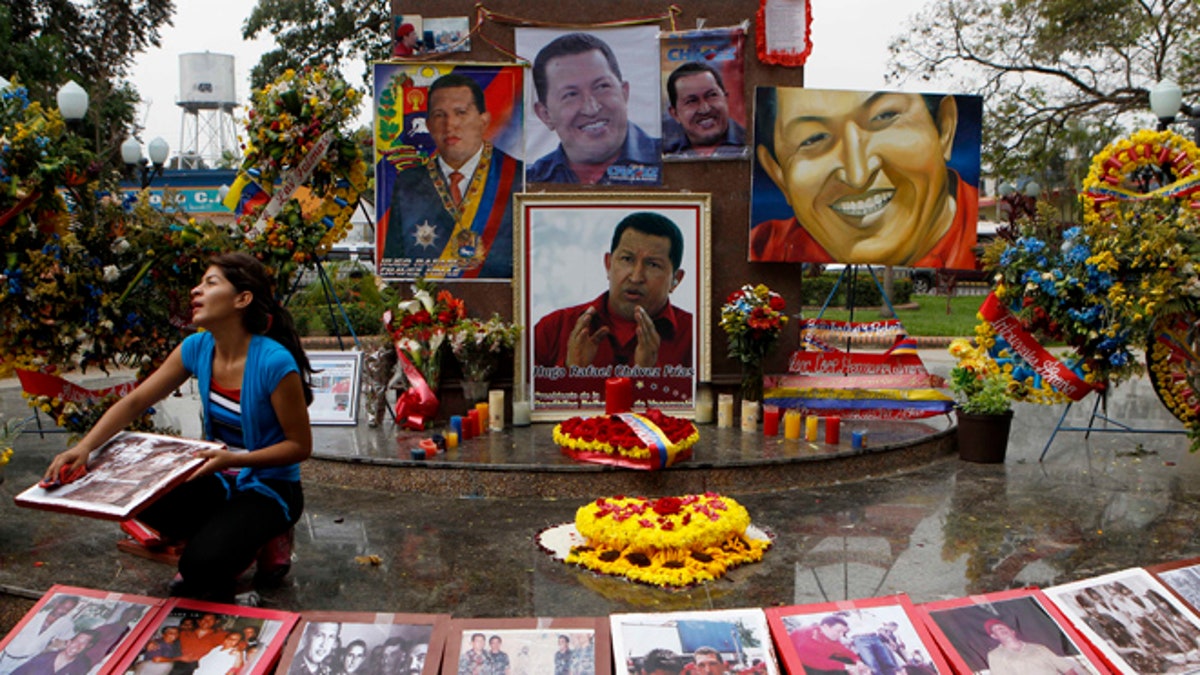
A woman wipes photos of late President Hugo Chavez at a makeshift altar set in his honor at the main square of Sabaneta, western Venezuela on Saturday, March 9, 2013. Chavez, who died of cancer on March 5, 2013 was born in Sabaneta. His former home has been turned into the local headquarters of the United Socialist Party of Venezuela, PSUV. (AP Photo/Esteban Felix) (AP)
It's difficult to make up one's mind as to whether the decision to award the late Hugo Chávez the 2013 Simon Bolivar Prize for Journalism reflects a healthy sense of humor on the part of the Venezuelan government, or none at all.
If it's a joke, then like all the best jokes, it's in very poor taste. It's like giving a human rights prize to Robert Mugabe, or a tolerance prize to the Iranian regime.
Venezuelans will always remember how Chávez clamped down on the independent media in our country. Truth or falsehood had nothing to do with it – if Chávez didn't like your politics, you were under the spotlight.
If this is not a joke, then it's evidence of how 14 years of Chávez's rule has blinded his hardcore supporters to that most human of instincts — irony.
The jury that awards the prize declared that Chávez was being recognized for giving "a voice to the oppressed of the world" and for fighting against "media lies."
A voice to the oppressed? Is this a reference to that legendary coterie of enlightened leaders, aka Hugo's Friends, which includes Mugabe, Ahmadinejad, the murderous Syrian tyrant, Bashar al Assad, and Europe's last dictator, Alexander Lukashenko of Belarus? It must be, because one of Chávez's favorite mind games involved rebranding these autocrats as loyal tribunes of the persecuted and downtrodden.
Media lies? Venezuelans will always remember how Chávez clamped down on the independent media in our country. Truth or falsehood had nothing to do with it – if Chávez didn't like your politics, you were under the spotlight.
In that regard, it is instructive that the award was announced by Lil Rodriguez, a bigwig in the pro-Chávez media. In many ways, Rodriguez owes her career to Chávez's determination to destroy any media voices who criticized his rule. In 2007, Chávez refused to renew the broadcast license of Radio Caracas Television (RCTV) accusing the station of encouraging strikes and protests against his regime. Despite mass protests against Chávez's action, RCTV was still closed down –they not only deprived them of the right to broadcast, the regime also stole all of their equipment– and replaced by the meekly compliant Televisora Venezolano Social, otherwise known as TVes. The president of TVes's Board of Directors is none other than Lil Rodriguez.
And the muzzling of independent, critical voices continues. The latest victim is Globovision; this once vibrant forum for broadcast and web journalism is now under new and not completely transparent ownership. One journalist, Kiko Bautista, was fired for defying editorial orders that banned live coverage of activities by opposition leader Henrique Capriles Radonski. All of Venezuela –and the democratic world– is watching to see what happens with the remaining independent journalists who continue to provide a voice to the democratic opposition.
A recent report on the Venezuelan media by the Committee to Protect Journalists offered the following blunt conclusion: "Today, several of the most critical media outlets are either gone or scared into silence, and a vast state media presence echoes the government’s positions."
It is against this context that the journalism prize posthumously awarded to Chávez should be judged. And it is another reminder to the people of Venezuela that even though Chávez is dead, his imitators try to continue controlling what we read, what we hear and what we see.
But neither Chávez nor his successors can control what we think. The net result of their censorship efforts, therefore, has been to ensure that Venezuelans trust very little of what is produced by the state-owned media. Also, the Stalinist mind-set of the new regime of Nicolás Maduro cannot understand the uncontrollable power of social media.
